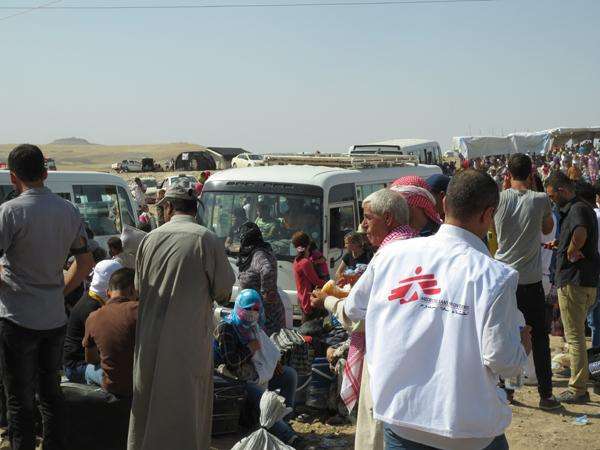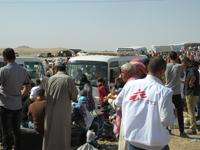Some 42,300 Syrian refugees have passed through a border crossing into Iraq since it reopened on August 15.
Syrian refugees are crossing the border into Iraqi Kurdistan in huge numbers, with more than 42,300 passing through the Peshkabour border crossing since it reopened on August 15. Teams from the international medical organization Doctors Without Borders/ Médecins Sans Frontières (MSF) have set up health posts on both sides of the border, providing medical consultations and distributing water to refugees waiting to be transferred to five transit camps currently being set up in Erbil and Sulaymaniya governorates.
“The refugees report having fled Syria from a variety of locations after hearing that the border had reopened after being closed for several months,” says Paul Yon, MSF’s head of mission in Dohuk. “But in recent days, the majority reported fleeing their homes around the city of Al-Malikiyah (also known as Derek) following sporadic aerial bombardments a few days ago.”
On the Iraqi side of the border, MSF teams have provided more than 200 general health care consultations to refugees waiting to be transferred to Erbil and Sulaymaniya. “We haven’t identified any critical health concerns so far,” says Yon. “The majority of patients are children, pregnant women and mothers who are suffering from moderate dehydration due to the long distances they’ve had to walk or the long waiting time before crossing the border. We are also seeing a lot of cases of asthma.” The number of consultations is increasing daily.
MSF’s teams are also providing medical advice to patients who need to be referred to hospital facilities. Yesterday, two wounded people crossed the border and were transferred to Dohuk hospital in ambulances provided by local health authorities.
On the Syrian side of the border, an MSF team on the ground since August 18 has distributed water to 6,200 people waiting to cross the border. The team will be reinforced today and will continue to provide water supplies to new arrivals, while also preparing to do more if need be.
“We are monitoring the situation and we stand ready to move our health posts in order to meet the needs,” says Yon. In coming days, MSF will also start providing general health care consultations to the refugees who have settled in different camps in Erbil governorate.
MSF teams have been working in the Domiz refugee camp in Dohuk governorate, where more than 42,000 Syrian refugees are sheltering, since May 2012, providing general health care and mental health services. MSF also plans to assess the needs of some 70,000 refugees who have settled in the city of Dohuk.





